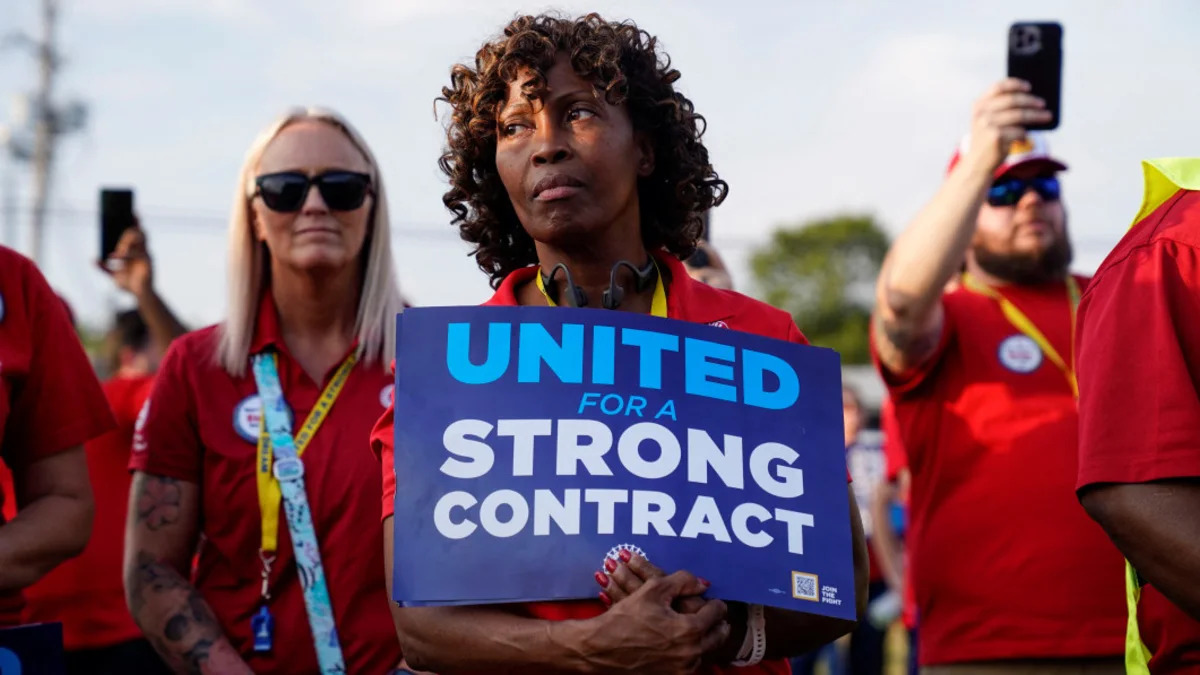DETROIT/WASHINGTON - The United Auto Workers on Thursday signaled the next step in the union's campaign to capitalize on its success in bargaining with the Detroit Three: launching organizing drives at Toyota, Tesla and other nonunion U.S. auto factories.
UAW President Shawn Fain began his video comments on the Stellantis contract with an appeal to workers at Toyota, which on Wednesday offered pay and benefit increases after the Detroit Three contract talks concluded.
"They could have just as easily raised wages a month ago or a year ago," Fain said of Toyota. "They did it now because the company knows we're coming for 'em."
He said the UAW's new contracts were so good they had even led to nonunion auto workers getting raises.
"Terrified auto executives across the country are rushing to give their own employees raises in the hopes of fending off the UAW," Fain added. "Toyota's future won't be determined in the boardrooms. It'll be determined on the plant floor."
The UAW has tried and failed for years to organize nonunion U.S. auto factories, most of them built by Asian and European legacy automakers in southern U.S. states where so-called "right to work" labor laws make it optional for workers to pay union dues.
Other foreign automakers are reviewing recent auto sector wage hikes. Honda told Reuters it was evaluating the recent UAW deals with the Detroit Three automakers and would remain competitive.
Before Fain spoke, Toyota said working together with its plant workers had provided a history of stable employment and income for its employees.
"The decision to unionize is ultimately made by our employees," the Japanese automaker said in a statement.
Fain has used recent video addresses to telegraph the union's determination to organize workers at nonunion automakers after record wage increases won in tentative agreements with Stellantis, General Motors and Ford.
"One of our biggest goals coming out of this historic contract victory is to organize like we’ve never organized before," Fain said on Sunday. "When we return to the bargaining table in 2028, it won’t just be with the Big Three, but with the Big Five or Big Six."
UAW Region 8 director Tim Smith, whose territory covers many nonunion auto factories in the southern United States, said workers at those plants have been reaching out to the UAW.
"If (Toyota workers) come calling, which they have, we're going to educate them and be there for them," Smith told Reuters.
UAW staff are keeping track of the calls, many from Toyota's sprawling assembly operation in Georgetown, Kentucky. The Toyota complex is not far from one of the UAW's largest local unions, which represents Ford's Kentucky Truck and Louisville Assembly plants.
Smith said it was important workers consider the total wages and benefits and not just the wage rate.
Recently, the union tried and failed to win enough support from workers at Tesla's Fremont, California, factory to hold an organizing vote. Tesla's Fremont plant was once a UAW shop when it was jointly owned by GM and Toyota and known as NUMMI.
"Nothing stopping Tesla team at our car plant from voting union. Could do so tmrw if they wanted. But why pay union dues & give up stock options for nothing?" Tesla CEO Elon Musk tweeted in 2018.
The UAW filed a complaint with the National Labor Relations Board over that tweet, and the NLRB ruled the tweet violated laws prohibiting management threats against workers for supporting unionization. A U.S. appeals court this year upheld the NLRB ruling.
Widening Cost Gaps
The UAW's organizing efforts from 2015 through 2020 were hindered by a federal investigation of corruption in the UAW's top ranks.
Fain won the UAW presidency this year by vowing wide-ranging reform.
Toyota's move earlier this week to raise wages is in line with the strategy the Japanese automaker and other nonunion automakers have used to keep UAW organizers at bay.
Nonunion automakers have kept hourly wages close to the UAW rates at the Detroit Three. But they have lower labor costs overall because they pay less for health and retirement benefits than the unionized automakers. They also use more temporary workers, who are paid less.
The result is that average hourly labor costs in total at foreign automakers are $55 an hour, compared with $64 an hour under the old UAW contract, Ford sources estimated ahead of the new contract agreements. U.S. hourly labor costs at Tesla are estimated at $45 to $50.
The gaps will get wider, assuming UAW workers at the Detroit Three ratify agreements that call for increasing pay for veteran workers by 25%, restoring cost-of-living allowances and boosting pay for temporary workers by as much as 150%.
(Reporting by Joseph White in Detroit and David Shepardson in Washington; Additional reporting by Lisa Baertlein in Los Angeles and Ben Klayman in Detroit; Editing by Matthew Lewis and Jamie Freed)


Sign in to post
Please sign in to leave a comment.
Continue